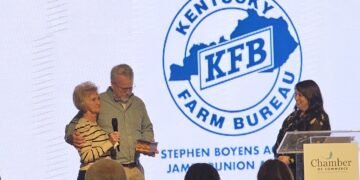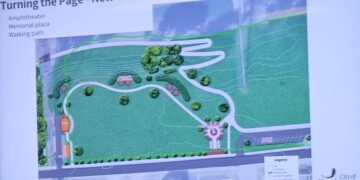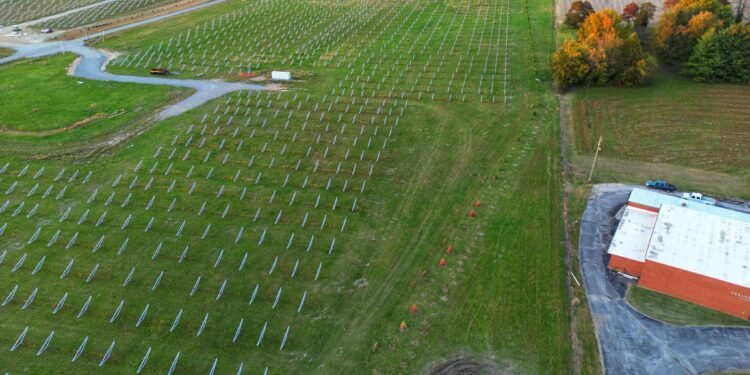Schneider says a battery energy storage system moratorium will come later
The Henderson County Fiscal Court is poised to approve a 2-year moratorium on any new solar energy projects in the county.
The court met Tuesday for a special called meeting to discuss the possibility of the moratorium, and within minutes it was evident that magistrates were on board to OK it.
Magistrate Taylor Tompkins, who represents the Robards area where two massive solar farms are currently being constructed, said he wasn’t aware of just how big of an impact the projects would have before they were started.
Of the moratorium, he said, “I believe it’s the right thing for the county.”
Magistrate Tim Southard agreed, saying, “We never dreamed it was going to be like this out there.”
Tompkins has been meeting with representatives from the solar companies on a weekly basis, he said, in attempts to make sure they do what they said they were going to do.
And many residents of the Robards area have voiced frustration with how massive the projects are and how much the character of their small town and nearby landscape has changed since the solar farms have been constructed.
According to a previous Hendersonian article, National Grid Renewables is developing its 1,500-acre Unbridled Solar Project immediately south of Robards—which will include 400,000 solar panels, according to the company—while NextEra Energy Resource’s two-phase Sebree Solar project will encompass 2,100 acres just to the north and west of Robards. Those 3,500 acres are the equivalent of 2,651 football fields, said the article.
But the moratorium will not affect those projects. It will only put a hold on any new solar developments from starting for the next two years.
Meanwhile, Schneider said county officials will monitor the effects of the current solar farms on the area. Specifically, officials will look at how the projects affect drainage and road glare. The judge-executive said there have been reports of glare coming off the panels causing unsafe driving conditions.
He said the two-year timeframe should allow enough time for vegetative buffers to be planted and mature, which will allow officials to determine if that screening will be sufficient, especially in light of neighbors complaining about their views.
Finally, Schneider said bonding put in place so that the county can pay for dismantling solar fields or other end-of-life issues may need to be reevaluated. He said with a new incoming president, current subsidies may be decreased or eliminated which could cause the county to increase bonding.
In the relatively short meeting, magistrates who wished for a moratorium also said they weren’t against solar farms or solar energy from locating in the county. They simply want more time to evaluate and study the new technology.
Also mentioned several times was how difficult the situation is when trying to balance the rights of an individual property owner with the desires of their neighbors.
“Where is that balance?” Schneider said. “It’s hard to find.”
Schneider said he and County Attorney Steve Gold will work on the language that will be added as an amendment to the county’s current zoning ordinance, which should be ready to be included on next Tuesday’s regular meeting agenda for a formal vote.
Lawsuits could be a concern, Gold said, mentioning companies that have done leadup work to locate solar in the county could claim the changing regulations are like the “goalposts are being moved.”
After the solar moratorium is approved, the judge-executive said the Fiscal Court will look at a moratorium for battery energy storage systems. The county has recently passed a zoning ordinance for BESS. But there isn’t a system in the county, so there’s no specific local issues that language for a BESS moratorium amendment could be based on, Gold said.
James Franks, a resident who lives near a planned BESS on Toy Anthoston Road, went door-to-door passing out flyers in order to get people to the meeting. He said he wants to ensure that all renewable installations that may come to the county are safe and the moratorium will allow officials to get a better handle on the dangers.
“Taking a pause is not saying” he’s against renewables, but “we just need to take a breath,” Franks said.























